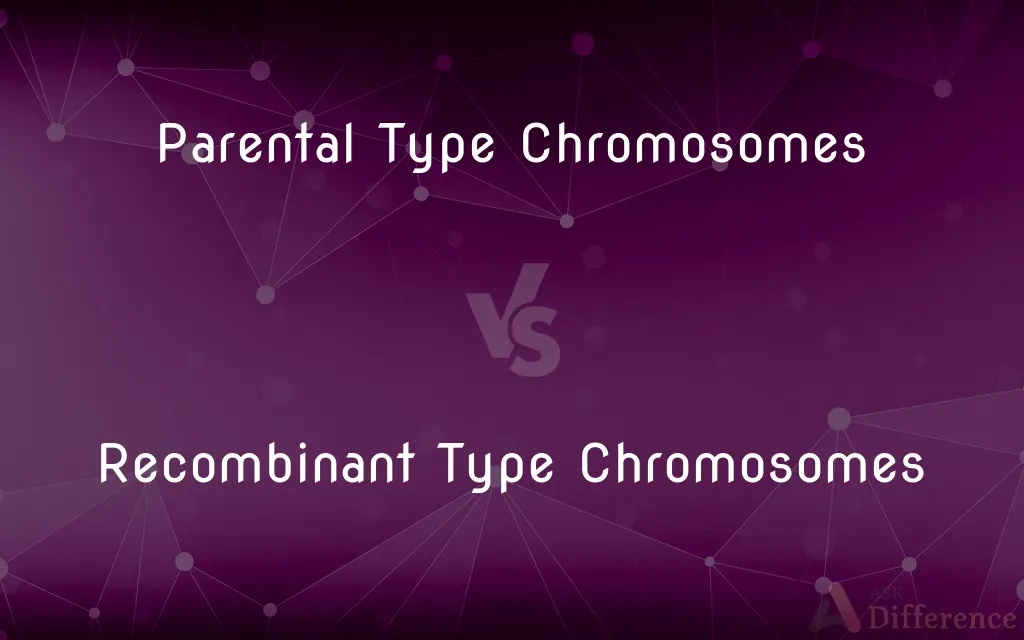Parental Type Chromosomes vs. Recombinant Type Chromosomes — What's the Difference?
By Tayyaba Rehman — Published on January 9, 2024
Parental Type Chromosomes carry the original combination of alleles as found in the parents. Recombinant Type Chromosomes result from genetic recombination, displaying a new combination of alleles.

Difference Between Parental Type Chromosomes and Recombinant Type Chromosomes
Table of Contents
ADVERTISEMENT
Key Differences
Parental Type Chromosomes are those that have the same allele combination as the original parent cells. They are inherited directly without any alteration in the allele combination during reproduction. In contrast, Recombinant Type Chromosomes result from the process of crossover during meiosis, where sections of DNA are exchanged between homologous chromosomes, leading to new allele combinations different from the parents.
In genetics, Parental Type Chromosomes reflect the genetic makeup of the organism’s parents and are essential for understanding inheritance patterns. Recombinant Type Chromosomes, however, represent genetic variation, which is a fundamental aspect of evolutionary biology and a driving force behind species diversity.
The formation of Parental Type Chromosomes occurs naturally during the process of gamete formation without any genetic recombination. Conversely, the formation of Recombinant Type Chromosomes is a more complex process involving the physical exchange of chromosome segments, introducing genetic diversity.
The frequency of Parental Type Chromosomes in offspring is typically higher than that of Recombinant Type Chromosomes, as recombination events occur less frequently than direct inheritance. However, the rate of recombination can vary depending on the species and specific genetic loci.
In genetic studies and breeding programs, Parental Type Chromosomes are crucial for predicting offspring traits based on parental characteristics. Recombinant Type Chromosomes, on the other hand, are significant in the study of genetic disorders, evolutionary biology, and in creating genetic diversity in breeding programs.
ADVERTISEMENT
Comparison Chart
Allele Combination
Same as parents
New combinations due to crossover
Formation Process
Direct inheritance without recombination
Involves genetic recombination during meiosis
Genetic Variation
Reflects parent’s genetic makeup
Introduces new genetic variations
Frequency in Offspring
Typically higher
Lower, depends on crossover rate
Significance
Important for understanding direct inheritance
Crucial for studying genetic diversity and evolution
Compare with Definitions
Parental Type Chromosomes
Reflects the genetic makeup of parents.
Parental type chromosomes in the progeny showed the inherited traits from their mother.
Recombinant Type Chromosomes
Less frequent than parental types in offspring.
In the genetic analysis, recombinant type chromosomes were less common than parental types.
Parental Type Chromosomes
Higher frequency in offspring than recombinant types.
The genetic study revealed a higher proportion of parental type chromosomes than recombinant ones.
Recombinant Type Chromosomes
Formed by genetic recombination during meiosis.
Recombinant type chromosomes in the offspring were the result of crossover events.
Parental Type Chromosomes
Carry the same alleles as the parents.
In the offspring, the parental type chromosomes matched exactly with one of the parents.
Recombinant Type Chromosomes
Significant in the study of genetic disorders.
The presence of recombinant type chromosomes can indicate susceptibility to certain genetic conditions.
Parental Type Chromosomes
Result from direct inheritance without recombination.
Parental type chromosomes are common in organisms reproducing without genetic crossover.
Recombinant Type Chromosomes
Display new combinations of alleles.
The recombinant type chromosomes showcased a mix of traits from both parents.
Parental Type Chromosomes
Important for predicting offspring traits.
Using parental type chromosomes, we can forecast certain genetic characteristics in the offspring.
Recombinant Type Chromosomes
Contribute to genetic diversity and evolution.
Recombinant type chromosomes play a key role in evolutionary adaptations.
Common Curiosities
What are Recombinant Type Chromosomes?
Chromosomes formed by crossover during meiosis, displaying new allele combinations.
What role do Recombinant Type Chromosomes play in genetics?
They are crucial for understanding genetic variation and evolution.
How are Parental Type Chromosomes inherited?
They are inherited directly from the parents without any genetic recombination.
How do crossover events affect Recombinant Type Chromosomes?
Crossover events during meiosis create new combinations of alleles in Recombinant Type Chromosomes.
Do Recombinant Type Chromosomes contribute to genetic disorders?
They can be involved in the development of certain genetic disorders.
Are Parental Type Chromosomes always identical to one of the parents?
Yes, they have the same allele combination as one of the parents.
Why are Recombinant Type Chromosomes important?
They introduce genetic diversity and are essential for evolution and adaptation.
What role do Recombinant Type Chromosomes play in evolution?
They increase genetic diversity, which is a key factor in evolutionary processes.
Which type is more common in offspring?
Parental Type Chromosomes are typically more common.
Can Parental Type Chromosomes predict offspring traits?
Yes, they are often used to predict traits based on parental genetics.
What are Parental Type Chromosomes?
Chromosomes that have the same allele combination as the original parents.
Can genetic studies distinguish between these chromosome types?
Yes, genetic studies can differentiate based on allele combinations and recombination events.
What is the significance of Parental Type Chromosomes in breeding?
They are important in predicting and maintaining specific genetic traits in breeding programs.
Are Parental Type Chromosomes solely responsible for inherited traits?
They play a major role, but Recombinant Type Chromosomes also contribute to trait variation.
How often do crossover events occur?
The frequency varies, but they generally occur less frequently than direct inheritance.
Share Your Discovery

Previous Comparison
Pentose Phosphate Pathway vs. Glycolysis
Next Comparison
Synopsis vs. SynopsesAuthor Spotlight
Written by
Tayyaba RehmanTayyaba Rehman is a distinguished writer, currently serving as a primary contributor to askdifference.com. As a researcher in semantics and etymology, Tayyaba's passion for the complexity of languages and their distinctions has found a perfect home on the platform. Tayyaba delves into the intricacies of language, distinguishing between commonly confused words and phrases, thereby providing clarity for readers worldwide.
















































